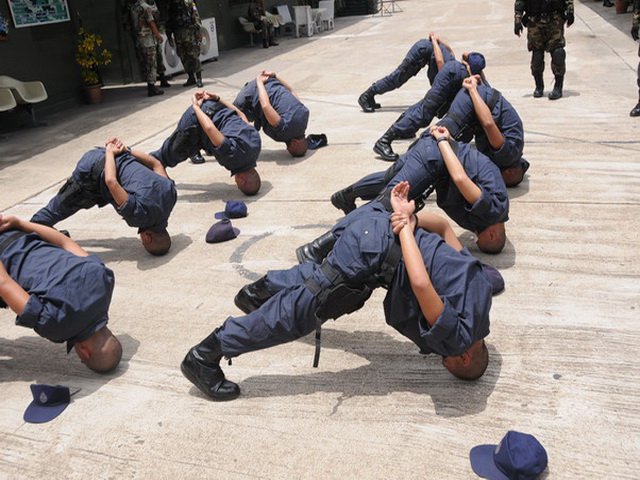As the death of a freshman cadet continues to trigger public outrage, Thai cadets are taking to social media to defend brutal corporal punishment at military academies.
Thai social media last week was overwhelmed by the death of freshman cadet Phakhaphong Tanyakan, whose
internal organs were inexplicably missing from his corpse when returned to his family. His parents claim that their son died from excessive punishment, while the death certificate issued by the military merely states that Phakhaphong died from “sudden cardiac arrest”.
According to Phakhapong’s diary, the cadet had been subjected to disciplinary punishments (called ‘repairing’) in the form of extreme amounts of physical activity such as push-ups, squats and long distance running. Each year these measures cause cadets and conscripts to suffer heat stroke and sudden cardiac arrest.
The death of cadets and conscripts during training is actually nothing new for Thai society. On Monday, there emerged a new report that one conscript underwent hip surgery after being kicked by his supervisor.
But it was the indifferent responses from military leaders that made society rally around Phakhaphong’s case. Leaders have publically explained that brutal corporal punishment and death during training is normal.
“I was once repaired more than I could take and I fainted too. I didn’t die. For this, before the school accepts kids for entry, they must give them a proper physical check-up,”
said Deputy Prime Minister Gen Prawit Wongsuwan.
“This kind of case is actually normal. Schools of this kind are ordinarily like this. There has been nothing exciting. Confirmation of the facts follows their own procedures,” said Pol Gen Chakthip Chaijinda, commissioner-general of the Royal Thai Police.
“Discipline maintenance” is a term commonly used by military staff to refer to their brutal “repairing”. Apart from the Deputy Prime Minister, various cadets and soldiers last week posted on their social media in support of “discipline maintenance”.
“It’s difficult to explain why we repair, or what we repair for. But as a soldier, it’s difficult to explain this to civilians. It’s like birds explaining to fish why they flap their wings. #nodrama #readnewscritically,” read one cadet’s Instagram.
“If it was my son who died, I would be proud and blame myself for letting my son have a weaker body than his 600 other classmates,” posted another cadet’s father, before later deleting the post.
Still, some soldiers who believe in human rights have reminded their colleagues not to be blinded by institutionalism.
“Before telling others to be critical, you should first be critical yourself. You have to think first if you are blinded by institutionalism. Are you claiming the honour and dignity of your career to discriminate against other careers and ordinary people? Are you sure that you are protecting the academy?” posted a former cadet,
Thatpon Srisupunbut, on his Facebook account.

